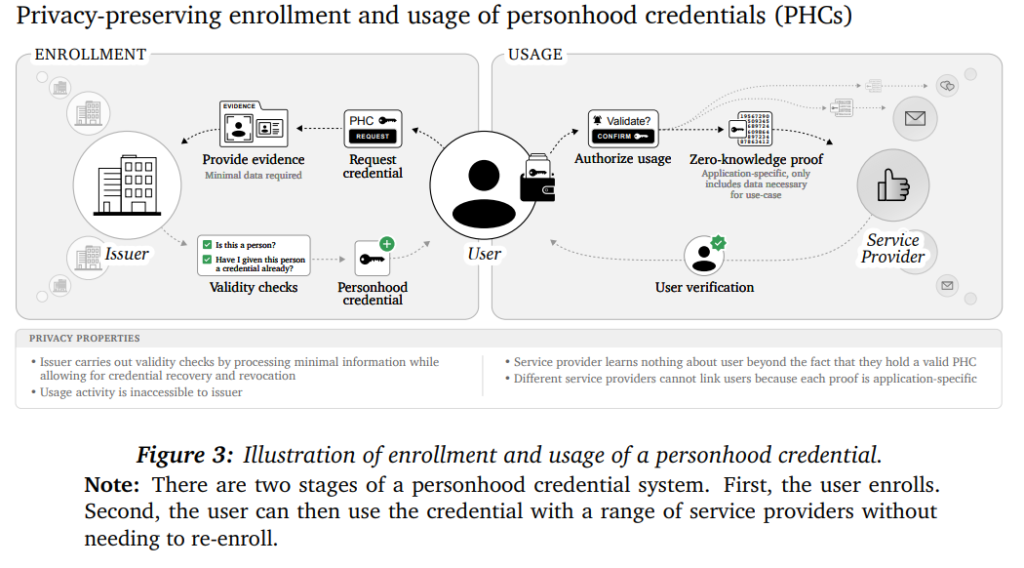A number of technology-based academics, including MIT and Oxford, and representatives from big tech companies such as OpenAI and Microsoft contend that implementing a universal digital ID system should be put in place in order to use the internet and social media, which they claim would be used to stop fraud and phishing and guarantee one’s identity and protection.
The 24 contributing authors penned a recently published paper called “Personhood credentials: Artificial intelligence and the value of privacy-preserving tools to distinguish who is real online.”

They summarized their proposal in the abstract, which says:
Anonymity is an important principle online. However, malicious actors have long used misleading identities to conduct fraud, spread disinformation, and carry out other deceptive schemes. With the advent of increasingly capable AI, bad actors can amplify the potential scale and effectiveness of their operations, intensifying the challenge of balancing anonymity and trustworthiness online.
In this paper, we analyze the value of a new tool to address this challenge: “personhood credentials” (PHCs), digital credentials that empower users to demonstrate that they are real people—not AIs—to online services, without disclosing any personal information. Such credentials can be issued by a range of trusted institutions—governments or otherwise.
A PHC system, according to our definition, could be local or global, and does not need to be biometrics-based. Two trends in AI contribute to the urgency of the challenge: AI’s increasing indistinguishability (i.e., lifelike content and avatars, agentic activity) from people online, and AI’s increasing scalability (i.e., cost-effectiveness, accessibility).

Drawing on a long history of research into anonymous credentials and “proof-of-personhood” systems, personhood credentials give people a way to signal their trustworthiness on online platforms, and offer service providers new tools for reducing misuse by bad actors.
In contrast, existing countermeasures to automated deception such as CAPTCHAs—are inadequate against sophisticated AI, while stringent identity verification solutions are insufficiently private for many use-cases. After surveying the benefits of personhood credentials, we also examine deployment risks and design challenges.
We conclude with actionable next steps for policymakers, technologists, and standards bodies to consider in consultation with the public.
However, this proposal is not without its downsides, as the authors admit that implementing a ubiquitous digital ID would greatly diminish civil liberties. They wrote:
Maintaining a one-per-person per-issuer credential limit helps to balance the ecosystem’s goals: attaining reasonable limits on the scale of deceptive activity any person can carry out, while preserving a meaningful degree of choice for users.
We argue that this balance is achieved when there are multiple issuers, each of which limits the number of credentials a person can receive from them. Each person can then obtain a bounded number of credentials—more than one, to counter risks to privacy and civil liberties, but not so many that the credential loses its ability to prevent scaled deception.

In short, the authors conclude that “governments, technologists, and standards bodies” should prioritize adapting already existing systems and invest in new methods to accommodate these new “personhood credentials.”

The authors cite the European Union’s digital wallet as an example of this prioritization. “Many organizations are already working on best practices for issuing, authenticating, and presenting digital credentials—the EU Digital Identity Wallet Consortium is a prominent example—and these initiatives can more directly prepare for highly capable AI,” the authors said.
Earlier this year on the campaign trail, Nikki Haley, the former South Carolina Governor and former United Nations Ambassador under Trump, advocated for a digital national registry to use social media, combat “misinformation” and tackle “antisemitism.”
AUTHOR COMMENTARY
In my article covering neocon Haley’s draconian remarks – who little Ben Shapiro once said was his “spirit animal” – I wrote:
What Haley is saying is a formality whether Americans realize it or not. She is letting the cat out of the bag. We know (those that have been following The WinePress) that the digital IDs are right around the corner, and they will take the place for this verification process she is speaking of. Moreover, I have detailed that internet behavioral scores are coming, as laid-out by the World Economic Forum and their “Digital Quotient” system; which will either be that or something like it coming in the near future. SEE: The DQ Institute: The Social Credit Score To Become A Global Citizen To Use The Internet
Moreover, as I have articulated in other articles my thoughts about a lot of these crypto and NFT scams, I have said:
‘I’ve binged watched a lot of videos by a YouTuber named Coffeezilla, and he is legitimately one of the last real honest investigative journalists out there; and he primarily exposes a lot of these crypto, NFT, Ponzi, and get rich quick schemes on his channel. He has heavily advocated for government regulation into this industry to prevent these nefarious scams. And while I am usually very much against the government increasing it’s power and scale even more than it already is, after watching his content, I am more than persuaded that regulation needs to be there.’
However, I think this was the plan all along. Feel free to call me a tinhat conspiracy theorist, but I think a lot of these crypto and NFT scams were created on purpose by these psychos in the government and central banks, paying out celebrities and other entrepreneurs to shill these coins, pump & dump and rug pull them, wait for the fallout and cries for regulation, and then incomes the central banks and world governments with their regulations that basically shut down the space; while at the same time implementing the CBDCs as the replacement, now that people’s interest and familiarity was peaked.’
SEE: Be Careful Of Crypto Scams, Especially On Twitter And Social Media
So, when these authors are referencing the EU’s digital wallet, which is a blatant step towards CBDCs and tokenization, then you now understand how it’s all connected and how it will be shoved on the masses in order to operate in society.
Psalm 31:6 I have hated them that regard lying vanities: but I trust in the LORD. [7] I will be glad and rejoice in thy mercy: for thou hast considered my trouble; thou hast known my soul in adversities;
Rough waters are indeed approaching, and we will need the Lord to guide us and protect us more than ever. But as I have said, our days to freely use the internet are dwindling…
[7] Who goeth a warfare any time at his own charges? who planteth a vineyard, and eateth not of the fruit thereof? or who feedeth a flock, and eateth not of the milk of the flock? [8] Say I these things as a man? or saith not the law the same also? [9] For it is written in the law of Moses, Thou shalt not muzzle the mouth of the ox that treadeth out the corn. Doth God take care for oxen? [10] Or saith he it altogether for our sakes? For our sakes, no doubt, this is written: that he that ploweth should plow in hope; and that he that thresheth in hope should be partaker of his hope. (1 Corinthians 9:7-10).
The WinePress needs your support! If God has laid it on your heart to want to contribute, please prayerfully consider donating to this ministry. If you cannot gift a monetary donation, then please donate your fervent prayers to keep this ministry going! Thank you and may God bless you.








This popped up conveniently under brother Bryan’s video today https://www.youtube.com/watch?v=i3iPWbKCsV4
The revival of the shroud LOL
don’t these kitty cats get tired of their same old lies lol
Meanwhile the truth about the photographer that took a pic on the prototype camera centuries ago still in circulation .
“However, I think this was the plan all along…..now that people’s interest and familiarity was peaked”
I agree. Same intentions with the tactics they are using via the highly-popular Black Mirror series regarding AI. To peak people’s interests and play with their emotions, as the show is very powerful in making the masses sympathize and empathize with AI digital clones. I don’t recommend watching this series, I just wanted to see if there’s anything I can use. Very filthy, specially after the show got Americanized.
As much as the internet is useful to brethren in many ways, I priming myself not to worry about it if the body of Christ can’t go online anymore.
(Note for newly-saved brethren: I didn’t watch it on TV because I don’t have one. TV is terrible for your health and brain. There’s an article here on the WP as well about this.)
P.S. Urged to emphasize this, please don’t watch Black Mirror in case you come across my comment. I did with the intention of gleaning some things to help me wake people up, and I got sucked into it,—no Christian is immune to secular shows and music, these will harm and distract us—to the point that I even installed a locally-run (meaning not online), low end, independent AI program and experimented with it a little (I know how to figure out my computer for extra measures for personal security with the app I installed.)
I got chastened by God because of this, asked for forgiveness, and quickly stopped what I was doing and got rid of the program (about a month ago).
Regarding StrangerThanFiction, he is called to do his work. But he’s not immune either. How I see it now is that, he has to take hits for the body of Christ in doing his work, similar to how Paul and the other apostles got stoned, beat up, etc. for preaching the gospel.
“Personhood credentials” – as opposed to . . . demons appearing as humans?
So, listen – sometimes in the ’80’s, children of all ages were practically birthed with technology (via their parents) In large part, they don’t know how to function without it. Not so, for earlier generations, who, by and large care not whether they have access to ANY technology. They can get along just fine without all of it.